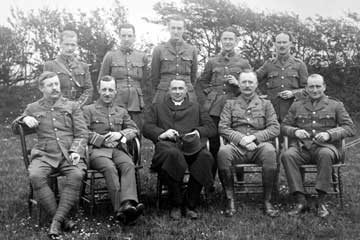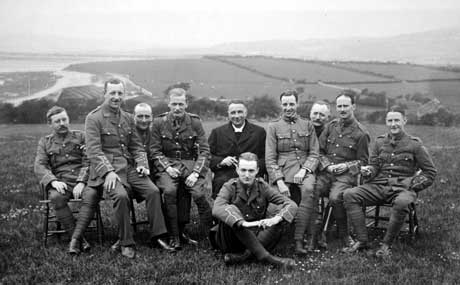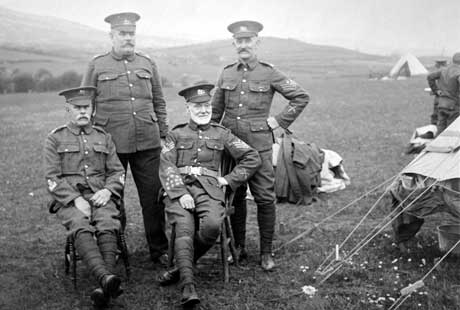PHOTO GALLERYTerritorial
Force 1908-1914
5th Battalion, King's Own, Whit Camp, Crag Bank, Lancashire 1913

Officers of the 5th Battalion at Whit Camp, Crag Bank, Lancashire, 1913.
Standing, left to right: Lieutenant Carter, Lieutenant W Fawcett,
2nd
Lieutenant Evans, Lieutenant F Eaves, and Lieutenant Parsons.
Seated, left to right: Lieutenant and Quartermaster Albert Hogkinson,
Captain
J M Young (Adjutant), Rev Bonsey (Chaplain), Major J H Bates
and Captain
Edward C Cadman.
Accession Number: KO0104/39

Officers of the 5th Battalion at Whit Camp, Crag Bank, Lancashire, 1913.
Left to right: Lieutenant and Quartermaster A Hodgkinson, Captain and
Adjutant J M Young, Major Cadman, Captain Carter, Rev. Bonsey
(Chaplain),
Lieutenant Lloyd Evans, Lieutenant Fawcett, Major Bates,
Lieutenant
Parsons and Lieutenant Eaves.
Accession Number: KO0104/41

5th Battalion, Whit Camp, Crag Bank, Lancashire, 1913.
The soldier seated right is Colour Sergeant Richard Watson, who
had a
long service with the volunteers and 5th Battalion.
Accession Number: KO0104/40
Colour Sergeant Richard Watson, of the 5th
Battalion, attended over fifty camps and one report indicates he spent
his 53rd camp by invitation of the officers so that his fine record
might not be broken. He had 13 service stars, each denoting four years
and was ‘well over seventy’.
From the Lancaster Guardian, 10 May 1919.
Death of an Old Volunteer
One of the best known figures in Lancaster passed away suddenly on
Monday, by the death of Mr Richard Watson, brush manufacturer, 72 Dallas
Road. It is interesting to note in view of recent educational
developments that Mr. Watson was apprenticed to Mr Wane, brush
manufacturer in King Street (the shop now occupied by Mr. Brockbank) at
the age of 9. He had worked no less than 71 years, first under Mr Wane,
then under Messrs. Marsden, father and son, successors in New Street,
and since June 1896 he had been proprietor of the business, which, 17
years ago was transferred to Church Street, the site being required by
the Co-operative Society.
Mr Watson married on 25 Dec 1862 Miss Hannah Patterson, second daughter
of Mr William Patterson, cabinet maker, shed died in 1899. Mr Watson was
summoned from the Isle of Man where he was in training with the
Volunteers, and found his wife dead, and the same day his shop caught
fire, so misfortune did not come singly.
Of their family one son and three daughters (Mrs Postlethwaite, Mrs C
Riley and Mrs F Atkinson who is in America) survive.
The death of his daughter, Jessie, last July was a great blow to him as
she assisted in the business.
He was working till Saturday, and called at the shop on Sunday for his
letters. Heart trouble caused the end.
Mr Watson will be remembered chiefly for his remarkable career as a
Volunteer. He joined the Lancaster Corps in 1863 when Mr Henry Gregson
was Captain. The Drill Hall was then in Brewery Lane in premises now
belonging to Messrs Yates and Jackson. His enthusiasm for Volunteering
was unique, being made Sergeant four years later. He rose to the rank of
Colour Sergeant and and president of the Sergeants Mess. The Lancaster
Volunteers drilled subsequently in the Exchange Hall, then the Assembly
room, and then the Drill Hall in Phoenix Street was built about 25 years
ago (1894).
Colour Sergeant Watson was a keen marksman, and won many prizes,
including the Borough Challenge Cup. He was most exemplary in his
attendance at drill, and was awarded the Battalion Silver Medal for 21
years continuous service in Sep 1886, while in Mar 1895 he was decorated
with the Queen’s Medal for over 30 years service as a Volunteer, along
with the late Drum Major Lamb. In Jul 1919, Colour Sergeant Watson
received from Dr. Lamport an oak barometer was a recognition of services
rendered to the St. John Ambulance Brigade, by granting the free use of
the Assembly rooms, of which he was a tenant for many years.
Mr Watson was proud of his record for attending Volunteer Camps, which
was unsurpassed. In 1895 he had been to 26 camps, and had doubled this
in 1914, when he went to Kirkby Lonsdale, but the outbreak of the war
caused the camp to be struck the second day. He went to visit the 1/5
King’s Own Territorials before they left for France, and often expressed
regret that he could not go with them.
It was only fitting that a man with such a fine service record should be
interred with Military Honours. The funeral took place on Thursday at
Lancaster Cemetery.
© Images are copyright, Trustees of the King's Own Royal Regiment Museum.
You must seek permission prior to
publication to any of our images.




